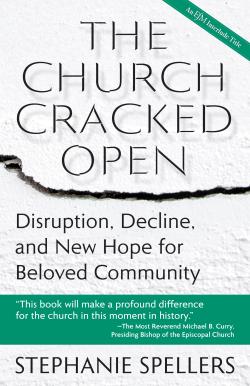The Gift of a Broken Jar

The first day of August 2020, a Saturday, probably didn’t feel overly optimistic to most people in the United States.
A little more than two months earlier, George Floyd had been killed under the knee of a police officer in a Minneapolis street, sparking hundreds of demonstrations protesting centuries of injustice rooted in white supremacy. The coronavirus pandemic had entered its sixth month, with the U.S. death toll approaching 200,000. A particularly bitter, polarized presidential election campaign was underway, and most U.S. faith communities had not gathered inside their church buildings since March.
God is breaking open this church and pouring us out—pouring out privilege, pouring out empire, pouring out racism and human arrogance. . . and I think it’s a gift.
The Rev. Canon Stephanie Spellers
And yet, on that day, the Rev. Canon Stephanie Spellers sent a text to a friend that read:
"God is breaking open this church and pouring us out—pouring out privilege, pouring out empire, pouring out racism and human arrogance—in order to remake us and use us to serve God’s dream for the whole world. We are the broken jar. It hurts and it sucks . . . and I think it’s a gift.”
That text message, really more of a revelation, became the inspiration and basis for The Church Cracked Open: Disruption, Decline, and New Hope for Beloved Community. It’s the second book authored by Spellers, who is Canon for Evangelism and Reconciliation for the Most Rev. Michael Curry, Presiding Bishop of The Episcopal Church. The book will serve as a basis for an online discussion The Church Cracked Open: The Challenge of Beloved Community on Thursday, February 3 at 6:30pm presented by Trinity Church Wall Street as part of its exploration of reconciliation as an agent for change.
Joining in the discussion will be Dr. Catherine Meeks, Executive Director of the Absalom Jones Center for Racial Healing.
In a book described as both critical and loving, Canon Spellers calls for a redefinition of “church” and focuses primarily on her own tradition, The Episcopal Church.
“Because of our unique history and privilege, we have often functioned as faithful chaplain to empire, upholding a tasteful banner to cover the sins of genocide, slavery, greed, segregation, and oppression. Every faith community has a story of choosing idols, ego, and sin over God. This is my church’s.”
The book’s title comes from the author’s suggestion that readers consider as a model the woman described in the gospel, in Mark 14, who breaks open an alabaster jar of costly ointment of nard to anoint Jesus. Canon Spellers sees acknowledgment of the sins of the past and the crisis of the present as, potentially, a step toward a more hopeful future.
“As America has grown more multicultural and secular, the so-called ‘Euro-tribal’ churches have fallen to the margins. While that loss of privilege could inspire fear and handwringing, it could also prime us for a dramatic reorientation. Decades of disruption and decline— culminating in the crises of pandemic, economic collapse, and racial reckoning—might be the shove we need to re-center away from empire and onto God and God’s dream.”







